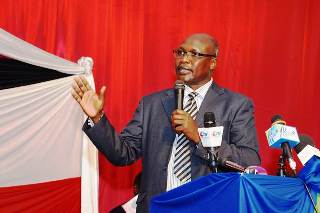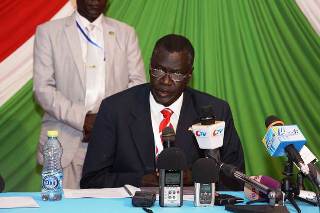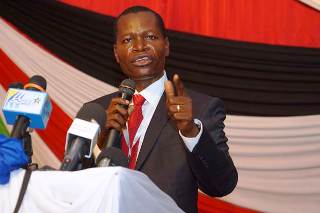South Sudan’s Equatoria region calls for peaceful leadership contest
May 9, 2013 (JUBA) – Intellectuals and senior political leaders from the greater Equatoria region have called on contestants for the top seat in the ruling party, SPLM, to refrain from violent politics and allow for fair and peaceful competition in the country.

The governors of the three states; namely Clement Wani, Louis Lobong and Joseph Bakosoro, respectively, attended the rare event and delivered speeches during the opening of the conference.
The two-day consultative gathering was also attended by the speaker of parliament and deputy chairman of the SPLM, James Wani Igga, as well as by the deputy secretary general of the party, Ann Itto, ministers and parliamentarians from the greater region.
The regional-based consultation on the country’s politics is a new turn of event that may unnecessarily drag the nation into regional blocs or alliances, say officials from other regions.
The greater Bahr el Ghazal has also announced that their regional leaders will meet in Wau, capital of western Bahr el Ghazal state, in the next few days to discuss “challenges facing the region.”
The three greater regions, Upper Nile included, were created in the difficult times of Kokora era in early 1980s, when politics turned tribal and regional as the former presidents of the then High Executive Council, which was formed after the 1972 Addis Ababa Agreement, became bitter rivals.
The current transitional constitution of South Sudan does not however recognize the former greater regions as it only provides for the three levels of government, which include the national, state and local levels, without referring to the former greater regions as legal blocs in the system.
While accepting party transformation and leadership contest as normal practice, the greater Equatoria leaders called on those involved to refrain from violence.
Speakers during the event, they called on the ruling party leaders to undergo the procedural internal transformation process, and warned contestants against sideling their region in the process.

Louis Lobong Lojore criticized leaders who “cook” ideas without involving the regional leaders from the beginning and then later on come to ask for support. “We must be involved from the beginning,” he said.
Western Equatoria governor, Joseph Bakasoro, called on the ruling party to imitate the recent internal discipline that was witnessed from the South Africans’ ANC party. Bakasoro also criticized what he said was negligent to the country’s national army, saying the government should make sure they are paid on time.
The speaker of parliament and deputy chairperson of the SPLM, James Wani Igga, who is an Equatorian, encouraged the regional leaders to promote economic activities so as to achieve food security in the country.
In a meeting of the SPLM Political Bureau last March, the speaker reportedly voiced to support the current president of government and party chairman, Salva Kiir, if Kiir wanted to maintain the seat till the year 2020, a position which was criticized by the many leaders in the region.
As a second thought, Wani, also said he would compete for Kiir’s top seat if Kiir decided to step down and allows for others to compete.
Speakers in the conference, however, advised not to make their colours known until the party basic documents are passed and campaign started.
The political bureau is expected to meet again next week for finalize the remaining basic documents such as the code of conduct and rules and regulations.
The highest party organ has completed the review of its manifesto but failed to agree on certain provisions in the draft constitution which is referred to the national liberation council for further deliberations.
Among the pressing issues to be confirmed by the national liberation council is whether a primary election will take place prior to the national convention where leaders will be elected.
The current chairman also wants handpick 5% of the candidates to the convention which was resisted as that would give him high ground against other competitors.

The presidential advisor and widow of the late founder of the party, Rebecca Nyandeng de Mabior, on Tuesday warned of “red lines” as she was referring to some of the contentions. It is also speculated that she supports Machar to lead the transformation process for the next phase.
Vice President Riek Machar and SPLM secretary general Pagan Amum were among the leaders who challenged Kiir to step down.
Machar asked his running mate in the last elections of 2010 to support him to take over the top seat. Amum however wants that he be allowed as the successor to Kiir and asked the two leaders to step down.
(ST)
